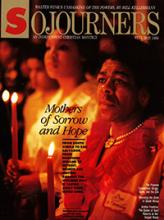The more than 400 women from 10 states, Canada, and the Netherlands who gathered in Des Moines, Iowa, March 4 and 5 for the third annual "Harvesting Our Potential" rural women's conference provided poignant testimony to the fact that the farm crisis is not over. The conference was co-sponsored by Prairiefire Rural Action, Inc. and the Iowa Inter-Agency for Peace and Justice, both based in Des Moines.
Read the Full Article

Already a subscriber? Login
